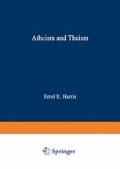Abstract
Throughout the foregoing discussion the assumption has been allowed that, if theism is to be accepted at all, it can be only upon faith, whether or not that faith may have some rational support. The first aim of the argument was to invalidate the claim of atheism to established knowledge. That we have accomplished and have been able besides to show that the arguments offered by atheists in support of their unbelief are hollow and self-defeating, that in fact they tend towards the opposite conclusion and require us in each case to affirm an inescapable self-transcendence of the finite. But the assumption that theism is purely a product of faith is dogmatic and arbitrary unless similar reasoning can dispose of all claim to conclusive rational demonstration, and no such reasoning has, as yet, been examined. We must inquire what rational arguments can be produced and whether they can be sustained.
Access this chapter
Tax calculation will be finalised at checkout
Purchases are for personal use only
Preview
Unable to display preview. Download preview PDF.
References
Encyclopädie §87, Zus. 1.
G. Ryle, ‘Mr. Collingwood and the Ontological Argument’, Mind, XLIV, No. 174, 1935, p. 142.
Contemporary logicians commonly deny that formal logic presupposes (tacitly or otherwise) any form of metaphysic—and my contention above implies that it does. In fact, I am convinced that an underlying metaphysic can always be revealed by careful examination of its doctrines, its rules and the way they are manipulated. An uninterpreted calculus can be applied only if its transformation rules are regarded as rules of inference and they can only be taken as such if they or some other feature of the calculus is assumed to correspond in some way to the nature of the things to which the calculus is being applied. Upon what the nature of things is taken to be will depend whether or not the calculus can be interpreted. And to decide that it cannot be interpreted is to affirm in effect that there is nothing in reality with reference to which its rules can function as laws of inference. In, what sense an uninterpretable calculus is logic at all may well be questioned, for of what could it be the logic?
Cf. R. G. Collingwood, An Essay on Philosophical Method, Ch. III; and my Foundations of Metaphysics in Science, Ch. XXII.
Cf. The Foundations of Metaphysics in Science.
This does not imply that all science is necessarily and finally true, for the advance of science is itself a dialectical development. Cf. my Hypothesis and Perception, (London, 1970) Ch. XI, and Dialectic and Scientific Method’ in Idealistic Studies, III, 1973.
Note that this definition is never appropriate to the deity conceived by the finite understanding.
Cf. my Salvation from Despair (The Hague, 1973), p. 125ff., and passim.
Cf. Hans Reichenbach, The Rise of Scientific Philosophy (Los Angeles, 1957).
Rights and permissions
Copyright information
© 1977 Tulane University New Orleans
About this chapter
Cite this chapter
Harris, E.E. (1977). The Rational Basis of Theism. In: Atheism and Theism. Tulane Studies in Philosophy, vol 26. Springer, Dordrecht. https://doi.org/10.1007/978-94-011-9785-4_4
Download citation
DOI: https://doi.org/10.1007/978-94-011-9785-4_4
Publisher Name: Springer, Dordrecht
Print ISBN: 978-94-011-9787-8
Online ISBN: 978-94-011-9785-4
eBook Packages: Springer Book Archive

